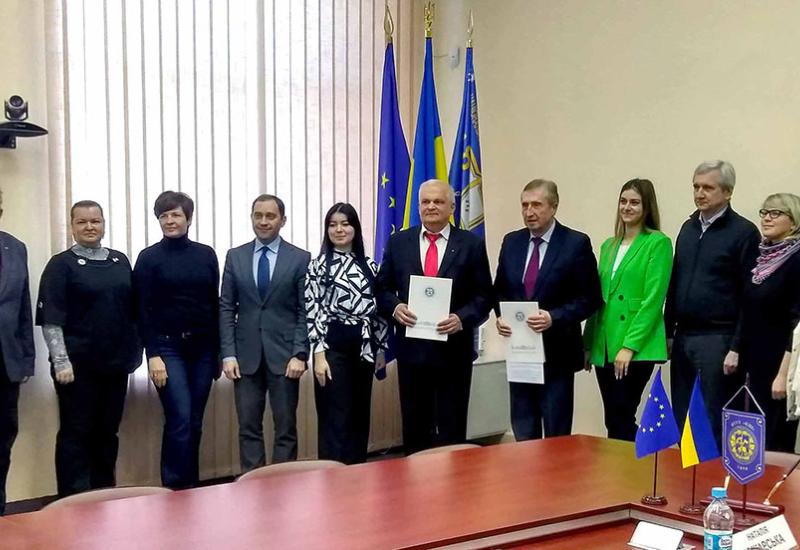On April 4, Igor Sikorsky Kyiv Polytechnic Institute and Kyiv-Pechersk Lyceum #171 "Leader" signed a memorandum of cooperation. The document was signed by the rector, academician of the National Academy of Sciences of Ukraine Mykhailo Zgurovsky, and on behalf of the lyceum - by the director Dmytro Kravchenko (see photo)..
Actually, some Igor Sikorsky Kyiv Polytechnic Institute departments have long-standing contacts with one of the most famous secondary schools in the capital, the Leader, but the signed document brings these relations to a qualitatively new level. The university and the lyceum have become full partners who will build their further actions taking into account new opportunities and prospects.
As the rector noted during the discussion of the specifics of cooperation, friendly relations will allow lyceum students and their mentors not only to get acquainted with scientific schools, work in laboratories and in scientific and technical clubs of the university, as well as involve individual students in the implementation of specific projects, but also to use the capabilities of the KPI campus - which includes sports facilities and grounds, a large Center for Culture and Arts, the best university scientific and technical library in the country, and much more. But the most important thing, he emphasized, is the environment, atmosphere, and communication that can ignite teenagers with the romance of science and technical creativity, which can ultimately determine their future profession and destiny, and the scope of their activities. "We would like to offer cooperation not only in one area, but in all the areas that our university has - in science, education, and innovation. And, of course, in the field of culture, sports, i.e. harmonious human development," emphasized Mykhailo Zgurovsky.
It is worth noting that the expansion of cooperation between the famous Kyiv lyceum and the country's leading technical university is a response to the challenges faced by the entire national education sector in recent years. The participants of the conversation spoke frankly about them. First of all, they talked about the gap that has formed between secondary and higher education in terms of introducing the basics of new technologies and fields of knowledge into school curricula, which have literally burst into our lives and are changing the possibilities of all mankind. And, of course, about the problems of teaching high school science, because there is an urgent need to raise the level of physical and mathematical education of students and, moreover, to develop their ability to use the acquired theoretical knowledge in practice. Bridging this gap is not just a matter of two specific educational institutions that have decided to work together, but of the entire education sector. "Therefore, it would be desirable to involve the Ministry of Education in this work, that is, to create a certain triangle. Because what we can do with you to bridge this gap is of a national nature," Dmytro Kravchenko said during the discussion.
The provisions of the document on cooperation are, in fact, only a declaration of a common vision of the direction in which to move. And its signing is not the end of the road to establishing true partnerships, but the beginning. "The memorandum is a framework document, and then we will need to work according to a plan that sets specific goals and objectives that we are trying to achieve," said Zgurovsky. "We, of course, need to create a joint team that will work out our action program. So, during the negotiations, the persons responsible for this activity were identified: from Igor Sikorsky Kyiv Polytechnic Institute, they will be Vice-Rector for Scientific and Pedagogical Work Oleksiy Zhuchenko and Director of the Department of Educational Work Olha Dzykovych, from the Lyceum "Leader" - Deputy Director Mariana Chalyk and Head of the Department of Computer Science Maria Kasyan.
Of course, in the educational and scientific sphere, several main areas of cooperation were identified that are most interesting for both the lyceum and the university. Dmytro Kravchenko spoke about them in more detail in a conversation with representatives of the university media: "These are the basics of system analysis, the basics of artificial intelligence, the basics of cryptography, the basics of aerospace engineering, and the basics of biotechnology. That is, those modern areas that allow a child to have certain theoretical knowledge gained at school and then, on the one hand, use it in practice, and on the other hand, prepare themselves for future engineering activities in this advanced field."
It is clear that such cooperation is no less important for Igor Sikorsky Kyiv Polytechnic Institute: thanks to it, the university is guaranteed to receive motivated and prepared for serious further study applicants. "If we support and contribute to the development of secondary schools, our higher education institution will receive better motivated and thoroughly prepared students," Olha Dzykovych shared her thoughts. "Therefore, according to the memorandum, we will primarily provide methodological support. We will also create so-called manuals and programs with their further implementation in secondary schools. In this way, together with the lyceum, we will try to create an experimental platform... Of course, we will be happy to see the lyceum students in our clubs, as participants in our engineering schools, subject competitions and contests, etc."

